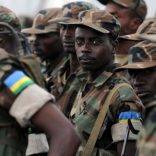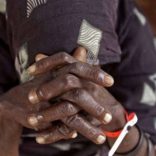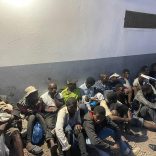Mozambique: 325 families from Mocímboa da Praia arrive in Mueda - Administrator
“War ‘declared'”: Report on latest military operations in Mocimboa da Praia and Macomia – Carta

Map: BBC
Two years into the spate of barbaric attacks against civilians, the military and public and private property in the northern and central districts of Cabo Delgado province, the situation in that province has taken on new dimensions, leading the Ministry of Defence (MDN) to issue communiqués and distribute images of the fighting in the “theatre of operations”, and claiming successive victories against the “insurgents”.
The fact is that since October 5, 2019, the Defence and Security Forces (FDS), in cooperation with the Russian paramilitary group “Wagner”, have been repeatedly defeating the insurgents who, in recent times, turned villages in remote administrative posts in the districts of Macomia, Mocimboa da Praia, Palma, Nangade and Muidumbe into ghost towns.
As we have learned from un-named official sources, the government is operating with its “Russian brothers”, but have however confirmed that a Russian-born soldier has lost his life during fighting against the insurgents at Mitope base between October 6 and 10, when a group of insurgents infiltrated the Wagner base and fired on the military. Five insurgents were shot during the engagement.
Since October 5, the FDS and the Russian group have been bombing insurgent bases in Macomia and Mocímboa da Praia. On the night of October 7, government forces caught by surprise and shot down more than 30 insurgents at the base of Marere, Mocímboa da Praia district – counted as one of the seven cells situated in the most battered districts. The surprise attack cost the lives of two Russian nationals.
From reliable sources, we learned that a Russian Federation ship entered the port of Nacala on 8 October, carrying just over 17 containers of different types of weaponry, with a special focus on explosives, which are currently being used on the battlefield.
The situation in the villages of the administrative posts of Mucojo, Quiterajo, Macomia, and Mbau, in the Mocímboa da Praia district, is “war”, confirming the view of analysts Calton Cadeado and Régio Conrado, who, in an interview with Carta, said that the Mozambican government should give the FDS more autonomy, and that their action should be more offensive than defensive and eschew all vestiges of sentimentality.
The fact is that in recent days the bases of the insurgents have been bombarded all the time, giving rise to the flight of insurgents into the woods. Meanwhile, thanks to drones monitored from Mueda General Headquarters, the insurgents, with little room for manoeuvre, are being shot.
Various FADM units are deployed, one group overseeing the maritime zone, another circulating the airspace and other military on land, with the emphasis on infantry, Special Forces, artillery and logistics batteries.
On 9 October, nine insurgents were captured in the Mbau region of Mocimboa da Praia, taken to the jungle, tortured and then burned, a source confided to the “Carta”. In conversation with this source, we learned that the insurgents were identified thanks to drones and helicopters, each intercepted while trying to escape.
The Carta team has learned that, between October 6 and 10, helicopters flew over Quiterajo, Miangalewa and Mbau, and even over Pemba, in an environment of ‘total war’.
The hunt for the insurgents began at midnight and ended only in thelate afternoon, when, using drones, helicopters and a group of military personnel in armoured vehicles and the others on the coast and on the border, the FDS and the Russians of the Wagner group surrounded them.
Another episode happened on the morning of Wednesday, October 9, when two alleged members of an insurgent group went to a hair salon in the village of Miangalewa in Muidumbe district to try to disguise themselves, but were seized by the population and handed over to police authorities.
Bombing and gunfire were intense in some Mucojo villages on Thursday, with the population first being moved to areas about 30 km distant to prevent civilian deaths.
Carta spoke to residents of Pemba and Mocímboa da Praia, who expressed satisfaction at the change of approach, saying that their desire was for the situation to change definitively because, they say, “the actions of the insurgents were already too much.”
By Paula Mawar and Omardine Omar












Leave a Reply
Be the First to Comment!
You must be logged in to post a comment.
You must be logged in to post a comment.